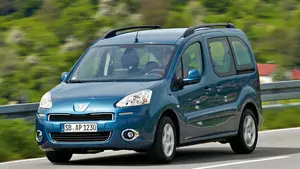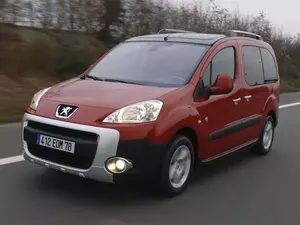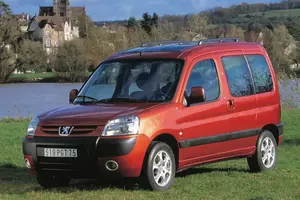
| Vehicle | Precise engine size | Difference from world average | Engine size to consumption ratio | Horsepower from 1 L | Engine size to 100 kg of weight |
|---|---|---|---|---|---|
| 1.6 BlueHDi |
1.56 L (1560 cc) |
33.5% smaller | 28 cc to 1 mpg | 63 hp from 1 L | 111 cc to 100 kg |
| 1.5 BlueHDi |
1.5 L (1499 cc) |
36.1% smaller | 27 cc to 1 mpg | 87 hp from 1 L | 107 cc to 100 kg |
| Vehicle | 1.6 BlueHDi |
|---|---|
| Precise engine size | 1.56 L (1560 cc) |
| Difference from world average | 33.5 smaller |
| Engine size to consumption ratio | 28 cc to 1 mpg |
| Horsepower from 1 L | 63 hp from 1 L |
| Engine size to 100 kg of weight | 111 cc to 100 kg |
| Vehicle | 1.5 BlueHDi |
| Precise engine size | 1.5 L (1499 cc) |
| Difference from world average | 36.1 smaller |
| Engine size to consumption ratio | 27 cc to 1 mpg |
| Horsepower from 1 L | 87 hp from 1 L |
| Engine size to 100 kg of weight | 107 cc to 100 kg |

| Vehicle | Precise engine size | Difference from world average | Engine size to consumption ratio | Horsepower from 1 L | Engine size to 100 kg of weight |
|---|---|---|---|---|---|
| 1.6 BlueHDi |
1.56 L (1560 cc) |
33.5% smaller | 28 cc to 1 mpg | 63 hp from 1 L | 120 cc to 100 kg |
| 1.5 BlueHDi |
1.5 L (1499 cc) |
36.1% smaller | 27 cc to 1 mpg | 87 hp from 1 L | 107 cc to 100 kg |
| Vehicle | 1.6 BlueHDi |
|---|---|
| Precise engine size | 1.56 L (1560 cc) |
| Difference from world average | 33.5 smaller |
| Engine size to consumption ratio | 28 cc to 1 mpg |
| Horsepower from 1 L | 63 hp from 1 L |
| Engine size to 100 kg of weight | 120 cc to 100 kg |
| Vehicle | 1.5 BlueHDi |
| Precise engine size | 1.5 L (1499 cc) |
| Difference from world average | 36.1 smaller |
| Engine size to consumption ratio | 27 cc to 1 mpg |
| Horsepower from 1 L | 87 hp from 1 L |
| Engine size to 100 kg of weight | 107 cc to 100 kg |

| Vehicle | Precise engine size | Difference from world average | Engine size to consumption ratio | Horsepower from 1 L | Engine size to 100 kg of weight |
|---|---|---|---|---|---|
| 1.6 HDi |
1.56 L (1560 cc) |
33.5% smaller | 35 cc to 1 mpg | 58 hp from 1 L | 111 cc to 100 kg |
| 1.6 VTi |
1.6 L (1598 cc) |
31.9% smaller | 48 cc to 1 mpg | 75 hp from 1 L | 114 cc to 100 kg |
| Vehicle | 1.6 HDi |
|---|---|
| Precise engine size | 1.56 L (1560 cc) |
| Difference from world average | 33.5 smaller |
| Engine size to consumption ratio | 35 cc to 1 mpg |
| Horsepower from 1 L | 58 hp from 1 L |
| Engine size to 100 kg of weight | 111 cc to 100 kg |
| Vehicle | 1.6 VTi |
| Precise engine size | 1.6 L (1598 cc) |
| Difference from world average | 31.9 smaller |
| Engine size to consumption ratio | 48 cc to 1 mpg |
| Horsepower from 1 L | 75 hp from 1 L |
| Engine size to 100 kg of weight | 114 cc to 100 kg |

| Vehicle | Precise engine size | Difference from world average | Engine size to consumption ratio | Horsepower from 1 L | Engine size to 100 kg of weight |
|---|---|---|---|---|---|
| 1.6 |
1.59 L (1587 cc) |
32.4% smaller | 55 cc to 1 mpg | 57 hp from 1 L | 113 cc to 100 kg |
| 1.6 HDi |
1.56 L (1560 cc) |
33.5% smaller | 38 cc to 1 mpg | 48 hp from 1 L | 111 cc to 100 kg |
| Vehicle | 1.6 |
|---|---|
| Precise engine size | 1.59 L (1587 cc) |
| Difference from world average | 32.4 smaller |
| Engine size to consumption ratio | 55 cc to 1 mpg |
| Horsepower from 1 L | 57 hp from 1 L |
| Engine size to 100 kg of weight | 113 cc to 100 kg |
| Vehicle | 1.6 HDi |
| Precise engine size | 1.56 L (1560 cc) |
| Difference from world average | 33.5 smaller |
| Engine size to consumption ratio | 38 cc to 1 mpg |
| Horsepower from 1 L | 48 hp from 1 L |
| Engine size to 100 kg of weight | 111 cc to 100 kg |

| Vehicle | Precise engine size | Difference from world average | Engine size to consumption ratio | Horsepower from 1 L | Engine size to 100 kg of weight |
|---|---|---|---|---|---|
| 1.4 |
1.36 L (1361 cc) |
42% smaller | 44 cc to 1 mpg | 55 hp from 1 L | 113 cc to 100 kg |
| 1.6 HDi |
1.56 L (1560 cc) |
33.5% smaller | 35 cc to 1 mpg | 58 hp from 1 L | 111 cc to 100 kg |
| 1.6 |
1.59 L (1587 cc) |
32.4% smaller | 50 cc to 1 mpg | 69 hp from 1 L | 122 cc to 100 kg |
| 1.9 D |
1.87 L (1868 cc) |
20.4% smaller | 55 cc to 1 mpg | 37 hp from 1 L | 144 cc to 100 kg |
| 2.0 HDi |
2 L (1997 cc) |
14.9% smaller | 49 cc to 1 mpg | 45 hp from 1 L | 154 cc to 100 kg |
| Vehicle | 1.4 |
|---|---|
| Precise engine size | 1.36 L (1361 cc) |
| Difference from world average | 42 smaller |
| Engine size to consumption ratio | 44 cc to 1 mpg |
| Horsepower from 1 L | 55 hp from 1 L |
| Engine size to 100 kg of weight | 113 cc to 100 kg |
| Vehicle | 1.6 HDi |
| Precise engine size | 1.56 L (1560 cc) |
| Difference from world average | 33.5 smaller |
| Engine size to consumption ratio | 35 cc to 1 mpg |
| Horsepower from 1 L | 58 hp from 1 L |
| Engine size to 100 kg of weight | 111 cc to 100 kg |
| Vehicle | 1.6 |
| Precise engine size | 1.59 L (1587 cc) |
| Difference from world average | 32.4 smaller |
| Engine size to consumption ratio | 50 cc to 1 mpg |
| Horsepower from 1 L | 69 hp from 1 L |
| Engine size to 100 kg of weight | 122 cc to 100 kg |
| Vehicle | 1.9 D |
| Precise engine size | 1.87 L (1868 cc) |
| Difference from world average | 20.4 smaller |
| Engine size to consumption ratio | 55 cc to 1 mpg |
| Horsepower from 1 L | 37 hp from 1 L |
| Engine size to 100 kg of weight | 144 cc to 100 kg |
| Vehicle | 2.0 HDi |
| Precise engine size | 2 L (1997 cc) |
| Difference from world average | 14.9 smaller |
| Engine size to consumption ratio | 49 cc to 1 mpg |
| Horsepower from 1 L | 45 hp from 1 L |
| Engine size to 100 kg of weight | 154 cc to 100 kg |